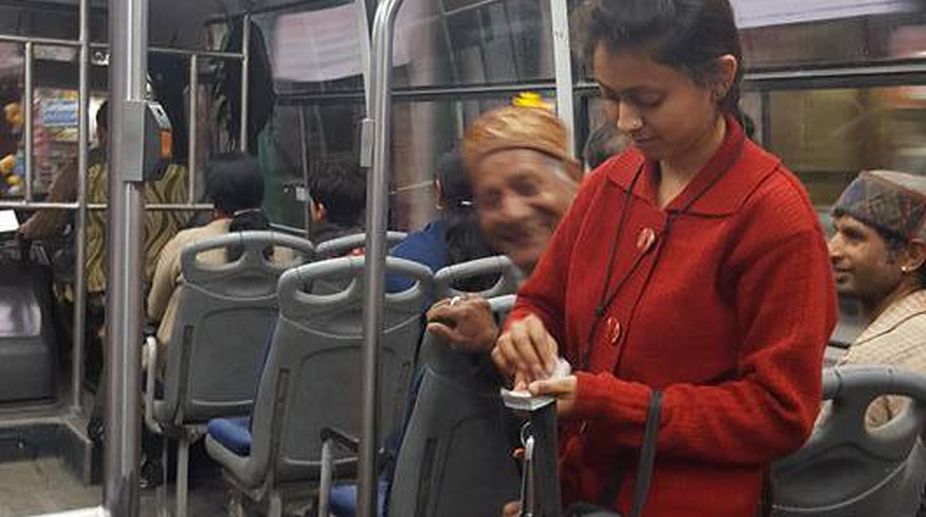Congress amends its Constitution, to reserve 50 per cent of all party positions for women, youth
The party amended its Constitution and made the social change at its 85th plenary session, here in Raipur.

(Photo: Facebook)
It's 6 am. Shilpa is ready for her morning shift as a bus conductor with the Chandigarh Transport Undertaking (CTU), the only state-run transport corporation in Northern India to have 33 per cent reservation for women.
In her mid-twenties, Shilpa (name changed) is one of the 100-150 odd women bus conductors who joined CTU about three years ago. A commerce graduate, she left the company secretary course she was pursuing mid-way after qualifying for the bus conductor post.
Advertisement
Her initial elation gave way to dismay. Passengers were often rude males or college-going students, headphones plugged in firmly in their ears, who didn't wish to be bothered about purchasing tickets; elderly people demanded seats and would vent their irritation on conductors instead of sorting out such issues amicably among passengers.
Advertisement
Three years down the line and having dealt with thousands of passengers, Shilpa exudes confidence now ~ except for one issue which still bothers her every day.
Shilpa says, "For many, a female donning a bus conductor's uniform is just not acceptable. Many gawk at me, some try to take advantage of the crowded bus and attempt to touch my hand while taking the ticket or giving money. They often become rude if I demand they buy a ticket or show their pass. Many times it ends in an argument and eventually I would have to keep quiet. I cannot change their mindset, after all," she quips.
Heena (name changed), a mother in her early thirties, joined as a bus conductor about 18 months ago. An Arts graduate, she lives in the city with her husband while her four-year-old daughter lives with her parents back home in Sonepat. She wanted to pursue a Master's degree, but circumstances at home forced her to take up the job. When asked what problems she faces while at work, she rues, "It is not an easy job. Many times, passengers seeing a woman conductor misbehave ~ and it doesn't just end there. Instead of feeling guilty, these passengers go ahead and send complaints of misbehaviour against us via emails. On an average, at least three-four complaints against women conductors land up with officials and when the officials ask us, we tell them our version of the incident.
When these passengers are summoned to explain their side of the story, they never turn up. By now, even the officials are aware that majority of these complaints are frivolous in nature".
Baljeet Kaur (name changed), who hopped aboard three years ago, says, "Not only do we have to fight the mindsets outside but within our own organisation as well. Many times, the drivers of the buses refuse to accept duties with women conductors.They say that women conductors are not capable of being good colleagues. Many of them come and tell us that they cannot interact with us frankly, the way they would with a male colleague. Some say that we are incapable of guiding them properly while parking the vehicle or reversing it. How can they generalise? It is like saying that all women drivers are bad".
Officials assigning duties have their gripes too. One says, "Every second day, there will be at least a handful seeking exemption from duty on medical grounds, citing one problem or the other. Since it is strenuous work, standing for eight hours, we try to accommodate as much as we can. Sometimes it's not possible."
"Over the past three years, when CTU first started recruiting women conductors in 2014, many of them have left the job already and yet many of them also want to be shifted for office jobs which do not require public dealing," he added.
Interestingly, most of the women conductors in CTU hail from Haryana, a state known for its skewed sex ratio, followed by Punjab. Clearly, there is still a long way to go before society accepts women in such a role. Still, their very presence is a step forward.
Madan Lal Sharma, a bus conductor with CTU for the past 28 years, of his 23-year-old daughter Ankita, a Master's in Commerce, who became a bus conductor about two months ago with CTU. Asked if he gets worried sometimes about rude passengers, he says, "Men and women are equal. We have to accept this in all aspects of our lives. I would never want my daughter to be put on an easy, less busy route. In fact, I would like that she should set an example for others to follow that women can do anything and that they are not less than men in any way".
Advertisement